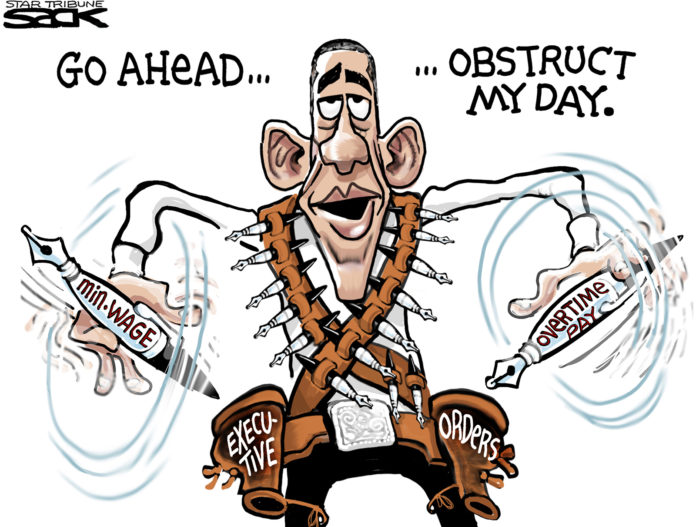BY RALPH NADER
Abraham Lincoln once said that “With public sentiment, nothing can fail; without it, nothing can succeed.” Presumably, he meant presidential action on popular issues can and should overcome influential interests.
At long last, the “public sentiment” seems to be aligning with some causes you are advancing.
First, support is increasing for restoring the federal minimum wage to account for the inflation that, since 1968, has greatly diminished its purchasing power. The federal minimum wage is presently stagnant at $7.25 per hour. You are supporting the Harkin-Miller bill [H.R.1010 and S.2223], which would raise it to $10.10 per hour over three years. You have already issued an executive order to require federal government contractors to pay their employees no less than $10.10 per hour, effective in 2015 [see timeforaraise.org for more information].
Restoring the purchasing power of the minimum wage has over 70% public support and would lift the wages of 30 million hard-pressed American workers. Had you pushed to raise the federal minimum wage in 2010 when the Democrats controlled Congress, the House of Representatives might not have been given over to the Republican Party in those November elections. In light of this missed opportunity, you can still pressure Speaker John Boehner and House Republicans to support raising the federal minimum wage by noting that Mitt Romney, Rick Santorum and former Republican Governor of Minnesota, Tim Pawlenty, now support this effort.
Affected workers need you to step up the pressure in the remaining months of this forlorn Congress and get an existing discharge petition to the House floor for a vote.
Second, U.S.-chartered giant companies like Pfizer, Medtronic and, perhaps most foolishly, Walgreens – given its 8,000 protestable stores – are planning to move their headquarters to countries that lure them with lower tax rates, such as Ireland and Switzerland, abandon their U.S. “citizenship,” and re-incorporate in those jurisdictions. This is all for another tax escape to add to their existing ones, including large tax credits to Pfizer and Medtronic for research and development that corporatist lobbies have written into the U.S. tax code.
“I don’t care if it’s legal, it’s wrong,” you have indignantly exclaimed in recent speeches. You are supporting legislative efforts by Democrats in Congress – H.R.4679 and S.2360, sponsored by Rep. Sander Levin, D-MI, and Sen. Carl Levin, D-MI – to prohibit such drains on corporate taxes intended for the U.S. Treasury and make the ban retroactive to May 2014.
Third, and perhaps most impressively, you are questioning the “economic patriotism” of many giant U.S. corporations who have received support [financial and otherwise] from U.S. workers, taxpayers and the public laws and benefitted from the infrastructure of our country. The mere implication that these companies are unpatriotically abandoning their native country has outraged the U.S. Chamber of Commerce [to which you paid a courtesy visit in 2011] along with the predictable Wall Street Journal editorial page.
That highly vocal reaction means you touched on a vulnerability that has been on the minds of tens of millions of Americans. May you continue to promote the importance of insisting on the patriotic character of corporations, since the U.S. Supreme Court [5-4] keeps telling us that corporations are people.
The public sentiment awaits your leadership on other positive redirections as well. Large majorities on both the left and the right favor breaking up the “too big to fail” New York City banks; support cracking down on corporate crime and fraud [see the Hide No Harm Act of 2014]; and, the more they know about its benefits and fairness, support a Wall Street speculation tax, a sales tax that could bring in about $300 billion a year, fund repairs of our public infrastructure, and dampen some of the reckless gambling with other peoples’ money, such as pension and mutual funds.
The many rallies in New York City, in front of the White House and around the country – some of which have been led by the National Nurses United – are pressing Congress for such a transaction tax. Such activities have laid the groundwork for your exercise of the “Bully Pulpit.”
Another easier initiative, pointed out in my new book, Unstoppable: The Emerging Left-Right Alliance to Dismantle the Corporate State, is to highlight, once again, the legislation that you as a senator co-sponsored with Sen. Tom Coburn, R-OK, in 2006 to require that the full text of all federal government contracts above a minimum amount be available online.
As I’ve written previously, putting the full text of these contracts online will give taxpayers both savings and higher quality performances; let the media focus more incisively on this vast area of government disbursements to inform the wider public; encourage constructive comments and alarms from the citizenry; and stimulate legal and economic research by scholars interested in structural topics related to government procurement, transfers, subsidies and giveaways.
There is already support by members of both parties in the Congress for this measure. Online disclosure would provide for greater scrutiny of some $300 billion in annual contracts by the media, taxpayer groups, competitors and academic researchers.
Yes, indeed, Mr. President, wondrous and beneficial changes can come to our country when you and Congress heed the long-standing “public sentiment,” more recently called the “voices of the people,” and translate that “public sentiment” into beneficial action by our government.
Sincerely,
Ralph Nader








